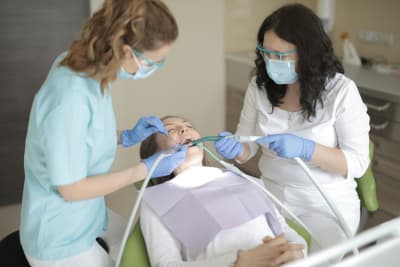The Bureau of Labor Statistics expects the employment rate for dental assistants in Kansas to continue growing over the coming decade. Individuals in the state who are passionate about dentistry can take advantage of the straightforward entry requirements to start a successful career in this profession.
While straightforward, candidates must pay attention to all the key aspects of the process to ensure a successful outcome.
In the following sections, we break down each aspect, from the basic requirements to the certification options. We also discuss annual average salary projections and the current career outlook for dental assistants in Kansas.
How to Become a Dental Assistant in Kansas
Below are the most important steps for starting a career as a dental assistant in Kansas.
Earning an Academic Award/Degree
Unsurprisingly, attending a community college or vocational school is one of the most effective ways to start a dental assistant career in Kansas. These schools equip students with a wide range of technical knowledge, from chairside assistance and infection control to sterilization, safety principles, and even administrative tasks and software applications.
Candidates can graduate from a dental assistant program with a certificate after a few weeks to a year of training. Some programs also offer an associate’s degree after two years of rigorous education.
One of the upcoming sections highlights the best programs for individuals in the states to consider.
Developing Practical Expertise
Candidates who undergo some form of real-world training as prospective dental assistants before securing employment find it easier to acclimate to a work environment.
Training programs facilitate practical expertise through laboratory sessions, externships, and internships.
Certification & Continuing Education
Certification is a very effective way to stand out and remain competitive as a new dental assistant anywhere in the country. In the next section, Kansas residents will discover quality certifications and professional credentials to pursue.
Even after securing employment, dental assistants are expected to continue to improve themselves through continuing education.
Explore trades with similar paths:
Licensure & Certification Requirements
The Kansas Dental Board does not expect dental assistants to receive a license before they start working professionally. As long as they are properly trained, professionals in this field can perform basic dental procedures under the supervision of a licensed dentist.
Advanced duties, including coronal polishing, require completion of a board-approved course. Radiology and nitrous oxide administration also require the completion of a special course approved by the board.
The Dental Assisting National Board is the authority on general and specialty certification nationwide. The board offers a Certified Dental Assistant credential for Kansas residents, which can help them get started and attain credibility among potential employers.
Top Dental Assistant Schools in Kansas
The entries below are among the best and most prominent for future dental assistants in Kansas.
Flint Hills Technical College
Kansas, KS Campus Only
Flint Hills Technical College has a dental assisting program that provides hands-on training in both clinical and office procedures.
Tuition
$0 - $6,019 per SemesterContact
(620) 343-4600
askus@fhtc.edu
Garden City Community College
Online, KS Online Only
Garden City Community College boasts a fully online Clinical Dental Assistant program covering anatomy, physiology, preventive dentistry, patient care, radiology, pharmacology, anesthesia, and specialty practices.
Tuition
$2,995 per ProgramContact
(855) 520-6806
Kansas City, Kansas Community College
Online, KS Online Only
Kansas City Kansas Community College offers a self-paced online dental assisting program designed for flexibility.
Tuition
$2,995 per ProgramContact
(855) 520-6806
Explore dental assistant schools in Kansas by city:
Salary & Career Outlook
According to a survey of Kansas professionals, dental assistants who work in Lenexa earn the highest annual average salary statewide, around $70,997.
The data obtained from the survey also revealed that Leawood and Overland Park come close at second and third, with annual average salaries of $70,320 and $69,844, respectively. Shawnee and Prairie Village round out the top five, where dental assistants manage annual salaries of $68,836 and $68,286, respectively.
Of course, location is not the only criterion that candidates can work on to improve their yearly returns as dental assistants in the state of Kansas. Experience, credentials, and work environment also matter.
However, without highlighting any of these factors, a dental assistant in the state can expect to end up with an average salary of $50,310 at the end of the year if they fall among the lower end of the spectrum. They will manage an annual salary of $83,902, though, if they are at the top end of the spectrum.
The most common dental assistants in Kansas are those in the middle, earning an average annual salary of $64,970.





